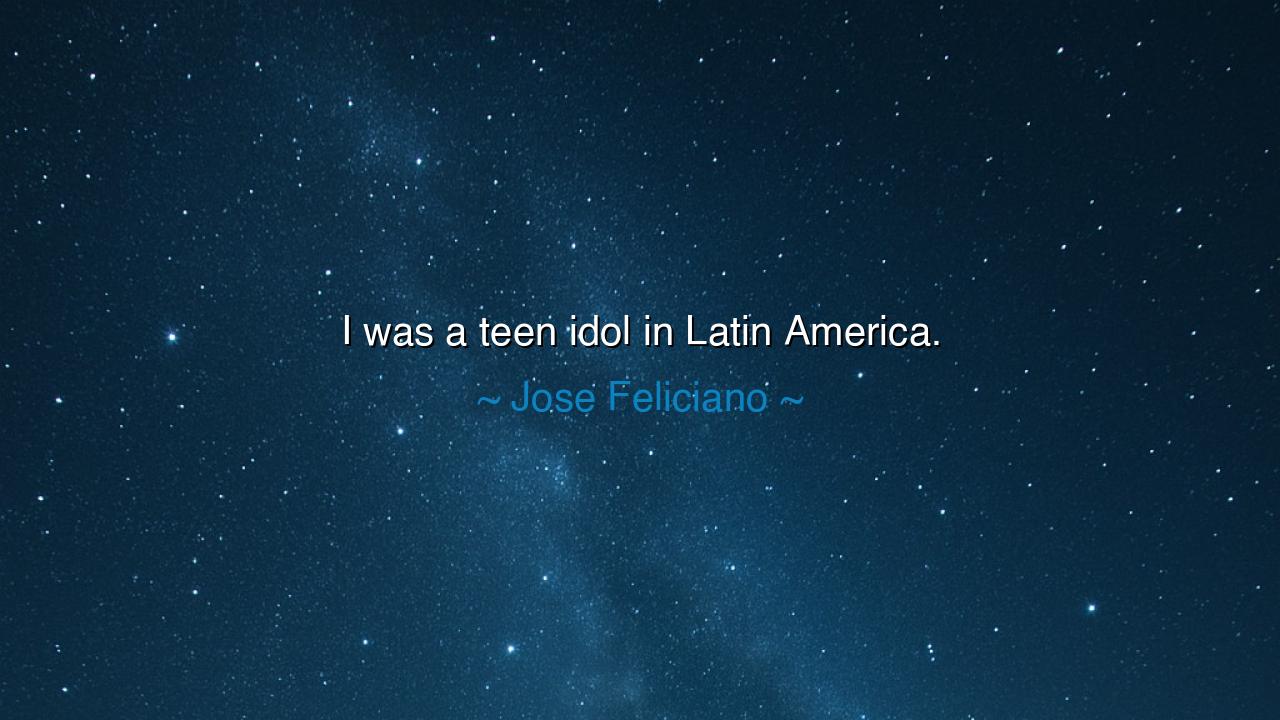
I was a teen idol in Latin America.






When José Feliciano declared, “I was a teen idol in Latin America,” he spoke not merely of fame, but of the burden and fire of being seen by multitudes. To be called an idol is not to live as an ordinary man—it is to be elevated, placed upon a pedestal where one’s life becomes symbol as much as self. In the flowering of youth, when most are still searching for their path, Feliciano already bore the gaze of countless admirers, their hopes and longings reflected back through his music. Such is the meaning of his words: the early coronation of a soul by a people hungry for light.
To be a teen idol is a paradox. On one hand, it is the gift of adoration, the applause of crowds, the sweet recognition that one’s voice, one’s art, can move hearts across borders. On the other hand, it is a heavy mantle. For idols are not allowed to be fully human—they must shine, even when weary; they must inspire, even when broken. Feliciano’s words thus carry both pride and weight: he was crowned early, and with the crown came both glory and constraint.
The setting of Latin America deepens this truth. For in those lands, music has always been more than entertainment—it is lifeblood, resistance, memory, and prayer. To become an idol there is to step into an ancient current where songs carry not just melodies but the dreams of entire nations. Feliciano’s rise in such a place meant that his youthful face and sound became woven into the fabric of collective identity. He was not only José—he was a vessel through which the people’s yearning found voice.
Consider the tale of Alexander the Great, who at an age when others still trained for war was already commanding armies and ruling empires. Youth did not spare him from the weight of greatness—it pressed upon him all the more. Likewise, Feliciano’s youth was not a season of carefree wandering, but a crucible in which his gifts were tested under the eyes of millions. Greatness, when it comes early, forges or breaks the soul. And those who endure, like him, pass through fire into legend.
Yet behind the phrase “I was a teen idol” lies also the fleeting nature of such crowns. For fame is like the morning dew—glittering for a moment before it fades in the heat of the day. The wisdom here is to remember that the idol of one age must transform to endure in the next. Feliciano did not remain only a teen idol—he became a master musician, a global artist, transcending the role that once confined him. This transformation is the secret of longevity: do not cling to the idol’s mask, but let the artist, the human, the truth, shine beyond it.
The lesson for future generations is clear: when admiration comes, welcome it with humility, but do not be enslaved by it. To be called an idol is a gift, but the truer calling is to remain authentic, to keep growing, to let one’s art deepen beyond the surface of youth. Fame without growth is a cage; growth without fame is freedom.
Practical wisdom follows: cultivate your craft beyond the applause. Whether in music, work, or life, do not measure yourself solely by others’ admiration. Seek instead to be worthy of your own respect. Accept recognition when it comes, but let it fuel your journey, not define its destination. And when the season of idolhood fades, as it always must, let the deeper fire of purpose remain, steady and unshaken.
Thus, José Feliciano’s words stand as both memory and teaching. He was once a teen idol in Latin America, but he became more than that—an enduring artist, a bridge between cultures, a voice carried across time. Let this truth echo: early fame is not the crown, but the beginning of a path. Those who walk it with wisdom transform from idols into legends, from fleeting stars into eternal lights.






AAdministratorAdministrator
Welcome, honored guests. Please leave a comment, we will respond soon